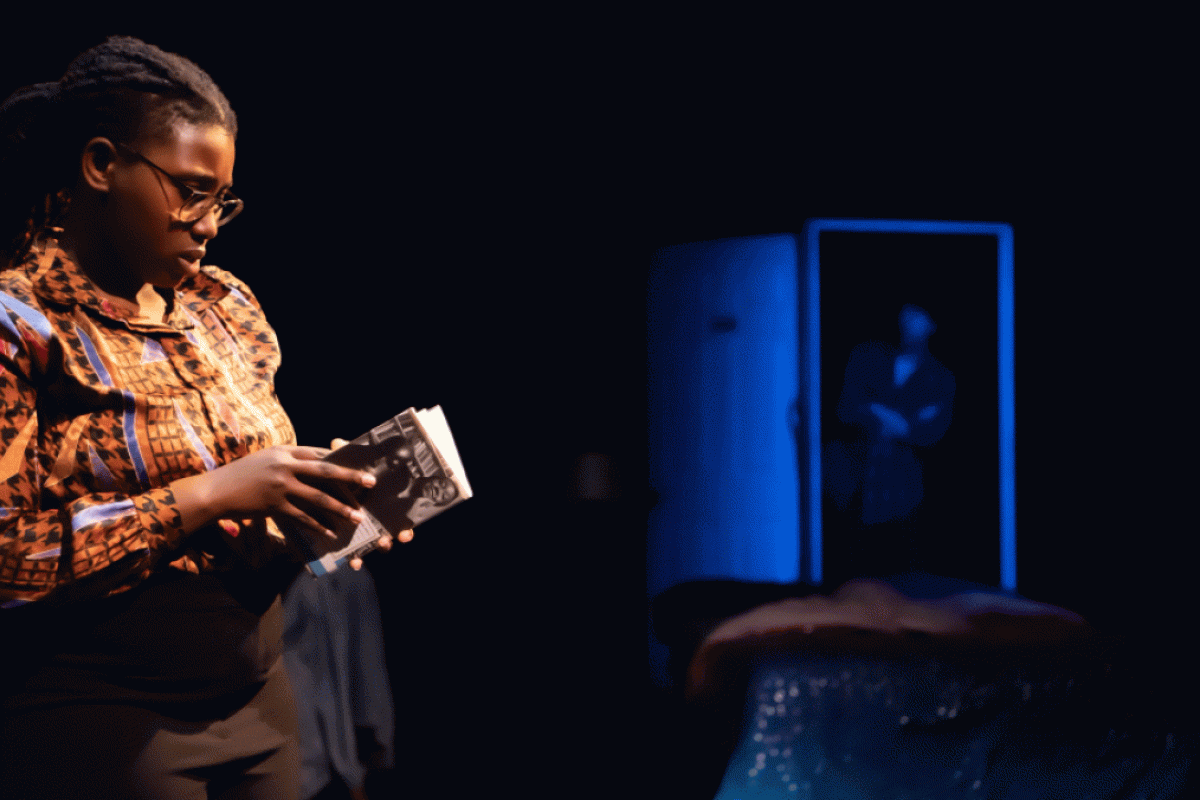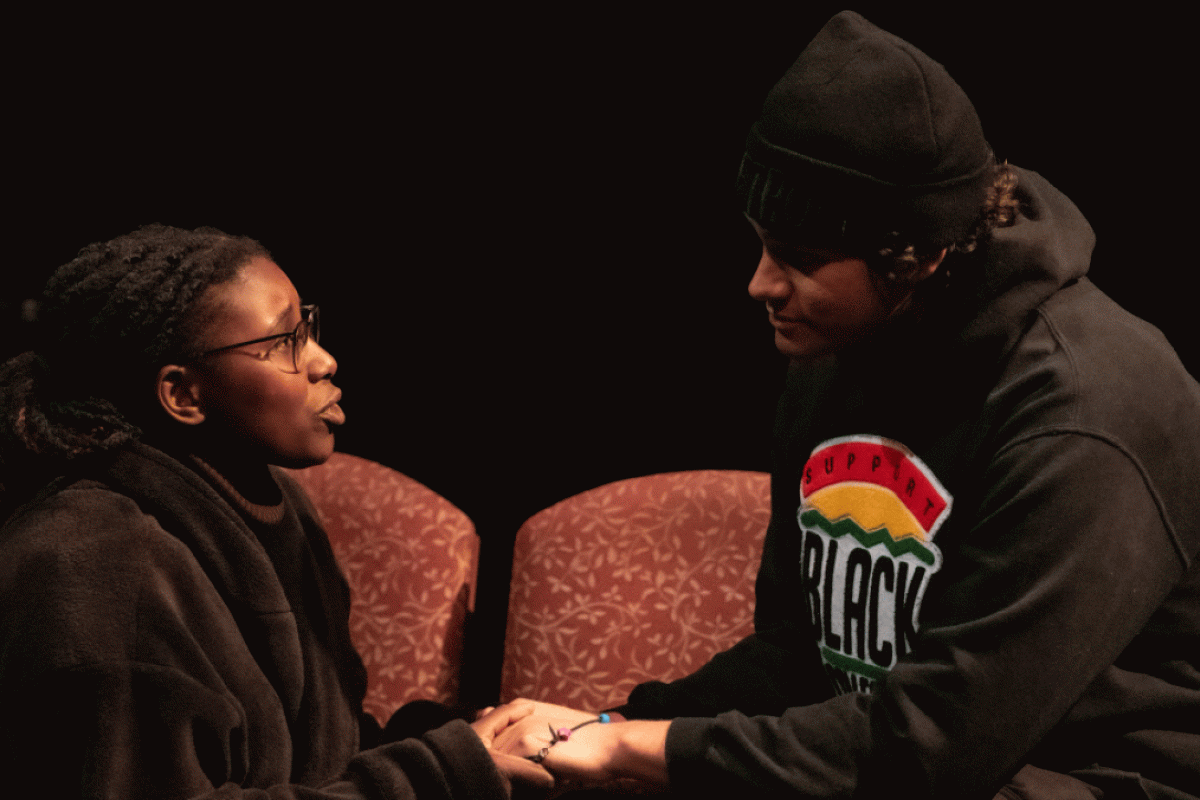Students work to bring Black theater to the stage at ASU

Henry Dyson in the ASU Black Theatre Organization presentation of Dominique Morisseau’s play “Pipeline.” Photo by Crestcencia Ortiz-Barnett
“It’s exhausting to hear about people who look like you and your family members who died — over and over again.”
This is how Arizona State University political science major Jackson Reed described the research process for the upcoming production of Dominique Morisseau’s play “Pipeline,” named for America’s infamous school-to-prison pipeline, where underprivileged and disadvantaged students are funneled out of public education and into juvenile and criminal justice systems.
"It really drills home the problem we have,” Reed said.
“Pipeline,” currently showing at the Nelson Fine Arts Center on Arizona State University’s Tempe campus, is presented by the ASU Black Theatre Organization, founded last year by Crestcencia Ortiz-Barnett, an MFA theatre (directing) student in the School of Music, Dance and Theatre who is also directing the play.
Ortiz-Barnett created the ASU Black Theatre Organization with the mission of showcasing art that depicts the Black lived experience and developing an artistic community for Black theater students at ASU’s Tempe campus.
“I would love to see a lot of young people at this show,” she said of “Pipeline.” “It’s for everyone, but I really want to show students that this is the kind of work we can do and to find themselves in it in some way.”
Set in Detroit, "Pipeline" takes a deep look into the American educational system for underprivileged students. In the play, an inner-city high school teacher is desperate to give her son opportunities that her students will never see and is determined to fight for his future.
“This play needs to be seen because we are still dealing with these issues,” Ortiz-Barnett said. “Some of the actors hadn’t even heard about the school-to-prison pipeline before this.”
To help the students better understand the background for the play, Ortiz-Barnett enlisted the help of student interns, who conducted extensive research.
Reed not only conducted research but will also serve as a panelist for a talk-back session that will take place immediately following the Feb. 26 show. He said that theater connects with people in a way that television or movies can’t, and that seeing “Pipeline” will really make people think.
“I hope audiences realize it’s an important issue and they don’t just brush it off,” Reed said. “I hope they go home, do their research, get educated, then get involved in making change.”
A communal effort
The production of “Pipeline” involves more than 20 ASU students, who are responsible for everything from acting to lighting design to stage management.
For Shayna Padjen, a theater and literature major, taking on the responsibility of costume design was a new experience.
“I had experience on the stage, but never really much behind the scenes,” Padjen said.
She said one thing that has made this production special is the focus on community throughout the process.
“Everyone is there when they can be — even every design member. Everyone is part of the rehearsals,” she said. “It’s become such a community. I’ve never experienced something like this before. With a story like this, it’s especially important.”
Padjen wanted to be part of the production when she learned about the story.
“Education is a topic that’s very important to me,” she said. “Knowing that was what the show was about made it even more important.”
Acting and fashion major Sean Schuljak also felt drawn to the importance of education and teachers in this play.
Schuljak plays the role of Laurie, an opinionated school teacher in her 50s who works to advocate for her students, despite an apathetic administration.
“My mom is a teacher, and in playing this role I learned a lot about the issues teachers deal with,” Schuljak said. “I learned how teachers are really trying to stand up and get kids the help they need.”
Schuljak said that Ortiz-Barnett has worked hard to provide opportunities for every student.
“I’m super excited to be showcased in such an amazing show,” he said. “As a member of the LGBTQ-plus community, I felt it was really powerful to be able to show what my community can do, to play this role and to have my own take on it.”
Nya Udengwu is a theater major who plays the role of Jasmine, the main character’s girlfriend.
“In some ways, she’s the comic relief,” Udengwu said. “You see her grow through the play and develop into her own.”
Udengwu said she really enjoyed bringing a bit of herself to the role, especially speaking on stage the way she does at home around family.
“It was a different experience to feel comfortable that way on stage,” she said. “I’ve enjoyed bringing a bit of myself to this role.”
She said despite balancing work, school, family and other responsibilities alongside rehearsals, it has been a worthwhile undertaking.
“I’ve had a lot of fun working with the cast,” Udengwu said. “I’m really proud of what we’re doing.”
To present “Pipeline,” ASU Black Theatre Organization has partnered with the School of Music, Dance and Theatre, ASU Multicultural Communities of Excellence, ASU Graduate College and Herberger Institute for Design and the Arts Culture and Access department. Additional support, including snacks and crew meals, has been provided by local business Detroit Coney Grill.
The show is free and open to the public, but seating is limited. Reservations are highly recommended.
“Pipeline”
Presented by the ASU Black Theatre Organization
7:30 p.m. Feb. 24 and 25
2 p.m. Feb. 26
Nelson Fine Arts Center, Room 133
Tempe campus
More Arts, humanities and education

ASU graduate education programs are again ranked among best
Arizona State University’s Mary Lou Fulton College for Teaching and Learning Innovation continues to be one of the best…
ASU FIDM students to see their designs on the runway at Uncertainty Fashion Showcase
Nola Hill is perfecting every stitch of her fashion design collection, which she started conceptualizing last summer.She is among…

ASU+GSV Summit brings experts together to discuss innovation in education
This week, Arizona State University President Michael Crow and other university leadership joined education and learning experts…





